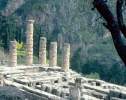|
|
|
HISTORY PAGE - GREECE/450 BC
| ~> Alexander | Greece | Rome | Spain | United States | More |
Alcibiades
 Alcibiades
(450-404 BC) was one of the most dramatic figures in Greek History. He lived
during the Peace of Nicias treaty which was a "cooling off period"
for Sparta and Athens. The ups and downs of Alcibiades life made his character
even more interesting. For example, when dabbled with various Spartan and Greek
affairs, there was extreme tension. Furthermore, since this was tinkering in
a time when the Boeotians held Panactum. Alcibiades would soon find himself
in the middle of three countries. As a result, his actions lead to many problems
for the Athenian, Spartan, and Persian forces.
Alcibiades
(450-404 BC) was one of the most dramatic figures in Greek History. He lived
during the Peace of Nicias treaty which was a "cooling off period"
for Sparta and Athens. The ups and downs of Alcibiades life made his character
even more interesting. For example, when dabbled with various Spartan and Greek
affairs, there was extreme tension. Furthermore, since this was tinkering in
a time when the Boeotians held Panactum. Alcibiades would soon find himself
in the middle of three countries. As a result, his actions lead to many problems
for the Athenian, Spartan, and Persian forces.
At the age of 30, Alcibiades (Perciles's nephew) was a respected Athenian Assembly man. He was also very wealthy, outgoing, and possessed charismatic qualities. However, according to Thucydides, Alcibiades was also condescending. For example, during the Spartan and Athens truce, he made himself chief negotiator between the two forces without the Assembly's approval. Eventually, he called for an attack on a particular Spartan controlled land. Within no time, Athens sent a large fleet over to Tangea. In 418 BC there was an intense battle between Athens and Sparta in Mantinea. This bloody battle left many Spartans dead. However, despite the bloodshed, the Peace of Nicias still remained.
In 416 BC, Alcibiades was considered a self-centered man who was only in the Assembly for his own beneficial gain. Furthermore, his lifestyle did not help out his image one bit. As an illustration, he owned more horses than any one man could ever afford. This outraged many Athenians but, since he was a prominent figure, very little could be truthfully said about him in open doors.
Alcibiades dishonesty "peaked" when he convinced the Athenian Assembly that Sicily needed to be invaded regarding strategic positioning. Once again, the Athenians responded to his requests immediately. So what was Alcibiades to gain? The Athenians would soon find out in a bloody way.
The Athenian Assembly launched the biggest fleet of ships and men any country has ever seen. This exaggerated "plan" sent men of all ages out to sea and into a battle in which they knew little about. According to Thucydides, during the days these troops were deployed, the streets of Athens were filled with many women and children crying to the gods "please don't take my son".
With all the sadness, an anti-Alcibiades campaign started brewing up. Many Assembly members began criticizing his actions and soon started calling him a "tyrant". Eventually, these accusations caught up to him in the form of "unfair influence". Specifically, certain members gathered enough evidence against him and called upon his arrest. When Alcibiades heard the news, he was out of Athens like a fling of Zeus's lightening. In a strange twist, Alcibiades decided head for Sparta because he realized that the Spartans could use his inside information.
When the Athenians reached Sicily, they found themselves on the defensive. In 415, the Syracusans (Spartan allies) and the Athenians fought a brutal battle. For 2 years, there was no victor. Soon after, both sides began seeking help from outside sources.
Eventually, the Spartans came to the aide of the Syracusans. With the help of Alcibiades, the Spartans felt very comfortable pursing this venture. However, for Alcibiades, he was able to kill two birds with one stone. First, he had a chance to establish his trust with the Spartans, and second he could pay "sweet revenge" to the Athenians.
Alcibiades initial revelations with the Spartans dealt with the land Declpea, which was in located in between Athens and the Boeotian border. This beneficial information put Alcibiades in a unique position.
Meanwhile, in Sicily, the Athenian's food and resources began to dry up. They were now in a position to either "search or flee". Also, with continuous Syracusan threats mounting, Athens overall plan was failing. When Lamachus, the Athenian leader was killed in a ferocious battle, Nicias (Athenian Assembly man and treaty founder) took control of the struggling forces and attempted to guide them through battle. Soon after, he wrote a letter to the Assembly stating that there was no way that his troops were going to survive unless they were sent additional troops and resources. Furthermore, he threaten to leave if no aide was granted. When the Assembly got the message, they immediately sent a barrage of troops including Eurymedon and Demosthenes. However, their arrival soon brought more failure.
 When
the new fleet arrived in Sicily, Demosthenes' men got crushed on the Syracusan
front. Apparently, fighting at night caused the Athenians more damage than help.
Nest, the fleeing Athenians decided that the idea of pulling out of Sicily without
the Assembly's approval was there only choice. However, with Demosthenes wanting
out, Nicias knew that he would take the blame if he went home. As a result he
decided to fight till the end.
When
the new fleet arrived in Sicily, Demosthenes' men got crushed on the Syracusan
front. Apparently, fighting at night caused the Athenians more damage than help.
Nest, the fleeing Athenians decided that the idea of pulling out of Sicily without
the Assembly's approval was there only choice. However, with Demosthenes wanting
out, Nicias knew that he would take the blame if he went home. As a result he
decided to fight till the end.
During the Athenian State of departure, the Syracusans killed Eurymedon in a violent confrontation. At this point, the Athenians had no where to flee. The Syracusans strategically blocked the Great Harbor by creating a large blockade of ships. Remarkably, Demosthenes and Nicias somehow figured out a way to stretch the battle out by winning key battles off sea. However, in the end, it was just too much. Finally, the Athenians decided to throw in the towel of defeat. When the Athenian's gave the Syracusan's their unconditional surrender, it was taken brutally. Specifically, during the capture, Demosthenes was executed while his troops lay rotting in horrid rock queries. For these prisoners, this was truly the end.
When the news hit Athens, shockwaves could be felt throughout the Assembly. Next the Athenians, sought the person(s) who authorized the Sicilian mission. Finally, in an effort to reduce growing tensions, the great "Sophocles" stepped in and attempted to bring peace to this dysfunctional Assembly by offering reasoning.
Meanwhile, Sparta joined forces with Persia. Since Sparta needed more ships and currency, Persia was the perfect match. With Alcibiades already on Sparta's side, he would soon use leverage to jump over onto the Persian side.
 Darius
II, from Persia, decided to use it's allied strength to manpower its way into
Greece. However, in order for this to be possible, they consulted Alcibiades.
Apparently, his timing was perfect because while he was in the middle of consulting
Persia, there was a strange myth brewing up with Alcibiades concerning the Spartan
King Agis. Apparently, he supposedly tried to seduce the king's wife in an attempt
to enter royal blood in the family. As a result, this theory has lead some to
believe that his shift from Persia to Sparta was a direct result of this incident.
Finally, Alcibiades told the Persians only to help the Spartans to the extent
of holding their own grounds and nothing more.
Darius
II, from Persia, decided to use it's allied strength to manpower its way into
Greece. However, in order for this to be possible, they consulted Alcibiades.
Apparently, his timing was perfect because while he was in the middle of consulting
Persia, there was a strange myth brewing up with Alcibiades concerning the Spartan
King Agis. Apparently, he supposedly tried to seduce the king's wife in an attempt
to enter royal blood in the family. As a result, this theory has lead some to
believe that his shift from Persia to Sparta was a direct result of this incident.
Finally, Alcibiades told the Persians only to help the Spartans to the extent
of holding their own grounds and nothing more.
When Athens heard of the Tissaphornes/Alcibiades partnership, the Assembly stated that if Alcibiades could bring a friendship with the Persians to Athens, then any past wrongdoing would be forgiven.
In 411, the final years of the war were very troublesome for Sparta. With Sparta in disarray, the Athenians took control of Hellespont. Soon after, the Athenian's overall moral grew very strong. Finally, Alcibiades was welcomed home. The Assembly officially welcomed him back by pronouncing him commander-and-chief. Eventually, the citizens praised him, and most importantly-he earned his citizenry back.
However, in 406, he was charged with abandoning an Athenian fleet off the coast of the Ionian coast. Soon after, his negligence got him fired as commander, and as a result, he lost a chance at becoming one of ten Athenian generals.
In Alcibiades final years, he became good friends with Socrates. As one of his finest students, he became very intellectual. However, when Socrates was indicted for corrupting the minds of the Athenian youth, Alcibiades felt bitter towards Athens. Soon after, he decided to consult his fellow Persians concerning this matter. Finally, in a strange twist of fate, Pharnabazus (satrap) under Lysanders orders, called for the assassination of Alcibiades. In the end, his house was set on fire and he was shot with a barrage of arrows. It turns out that the men who killed Alcibiades were a pair of disturbed brothers who claimed that their sister was man handled by the former Athenian Assembly man. Finally, it is important to note that his death occured in 404 BC which was near the end of the late classical period.
Free Stuff | E-Commerce Links | Music Page | Finance | Web Design | E-mail | Multimedia | Research
Going To Graceland, All Rights Reserved 2000